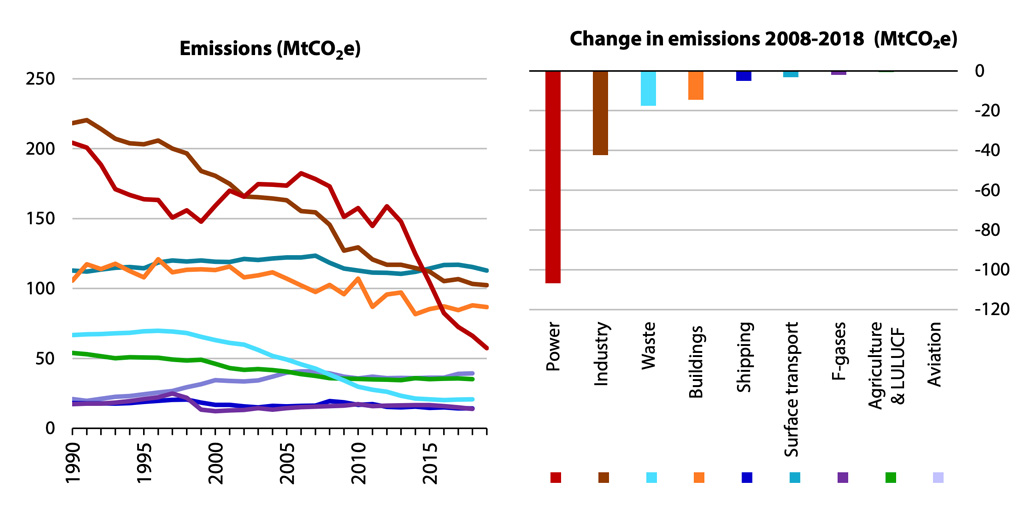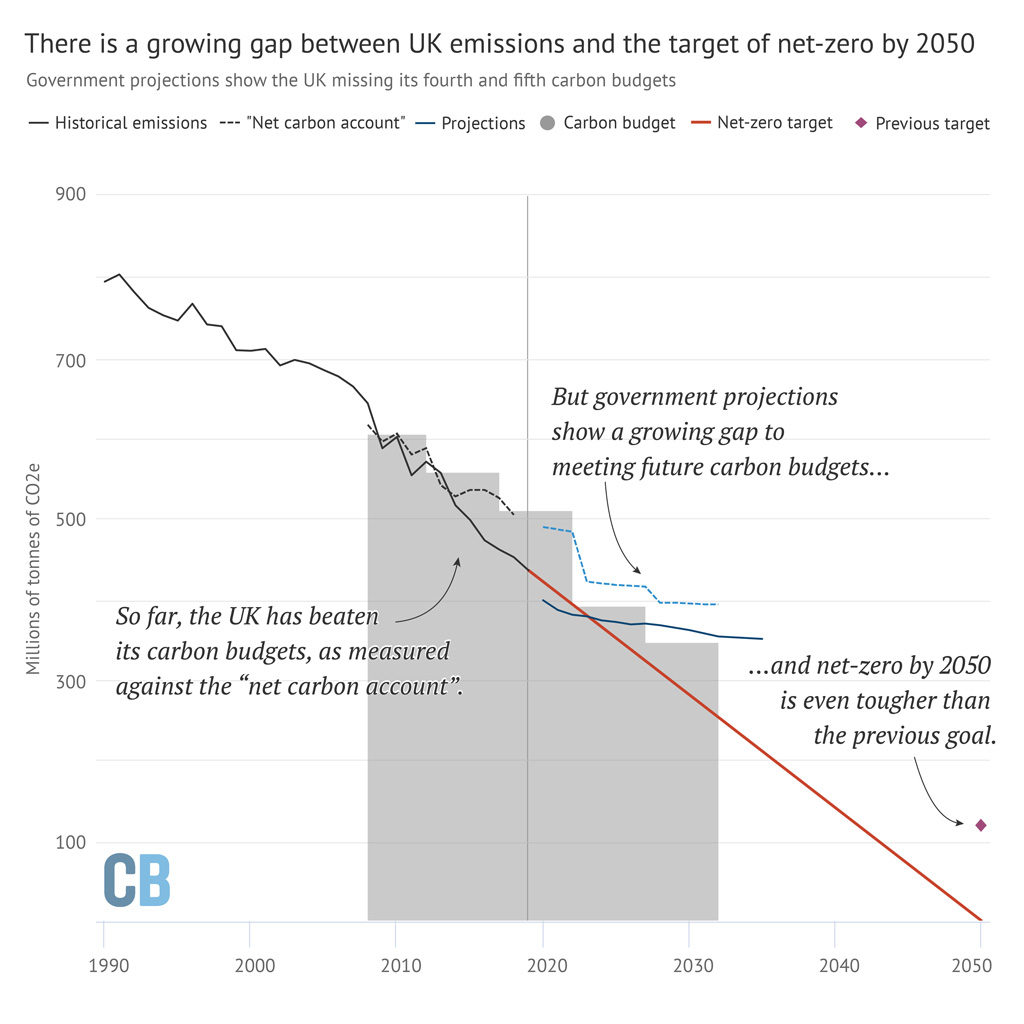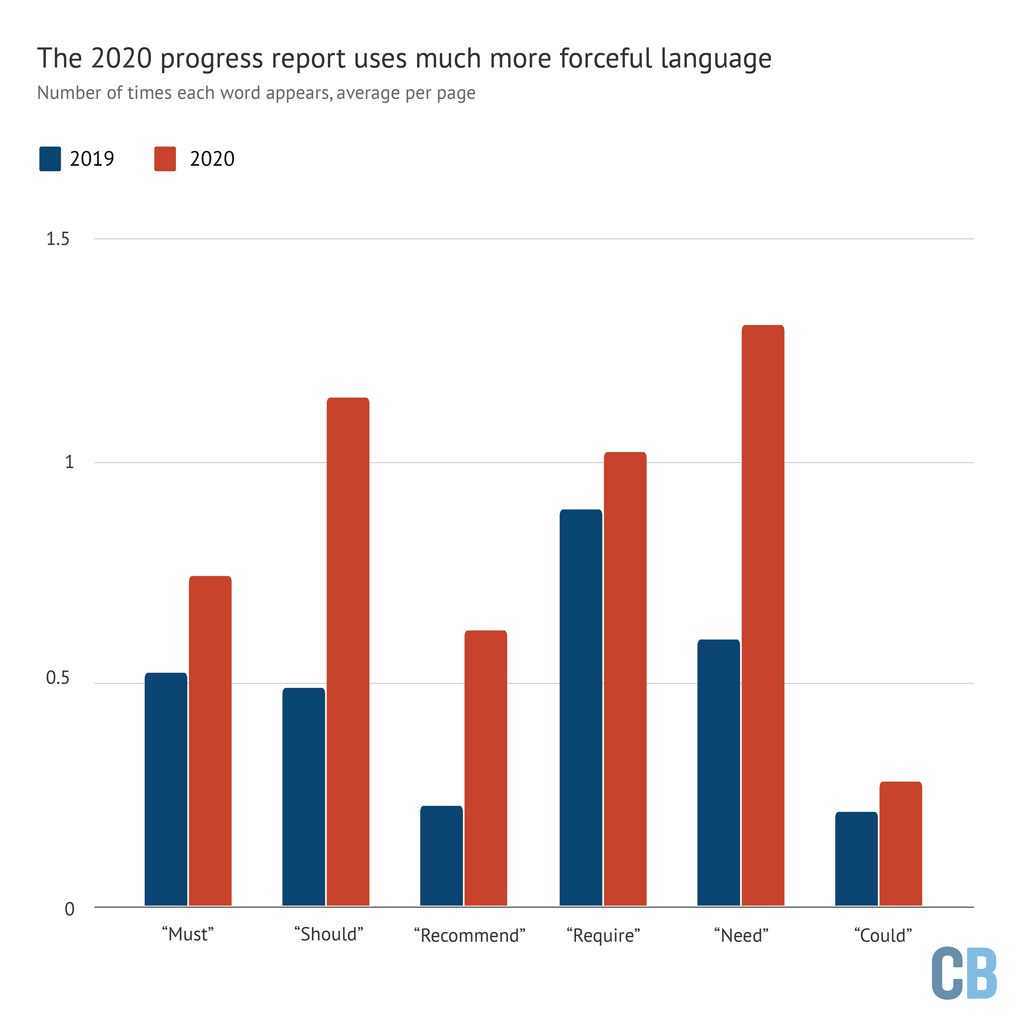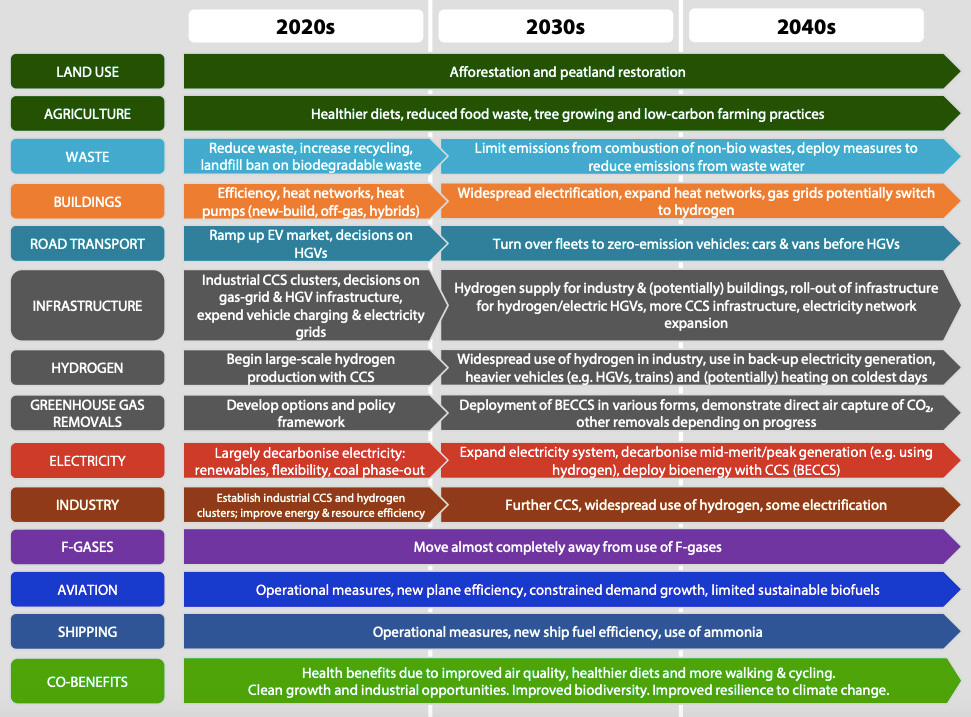
CCC: UK risks ‘egg on face’ unless it accelerates climate plans
Multiple Authors
06.25.20Multiple Authors
25.06.2020 | 12:01amThe UK government “must seize the opportunity” for a “green recovery”, says the Committee on Climate Change (CCC) in its latest report.
This “once-in-a-lifetime” chance, enabled by the coronavirus crisis, is outlined in the CCC’s bumper 196-page annual “progress” report. It also highlights a lack of progress by the government over the past year towards delivering the UK’s climate goals.
The UK has failed on 17 out of 21 progress indicators, falling further behind in many areas, says the CCC. And just two of 31 key policy milestones have been met over the past year, it adds.
Chris Stark, the CCC’s chief executive, tells Carbon Brief he is willing to cut the government “a bit of slack” in light of the coronavirus crisis, but warns “we won’t do that next year”.
The year-long delay to the COP26 climate talks in Glasgow is an “absolute blessing” for the UK, says Stark. It gives the government time to “get its ducks in a row” before hosting the crunch UN summit in late 2021, he says: “They are going to have egg on their face unless they get this year right.”
The report lists what the government “must” do over the next 12 months, with a focus on the Covid-19 response. For the first time, the list is also broken down, department by department, to allow for more direct accountability and clearer messages for government officials.
How is the UK doing on its climate goals?
This year’s progress report includes a lengthy review of what has happened, internationally and domestically, since the UK’s Climate Change Act was passed in 2008.
Many developed countries have seen their emissions peak, the CCC says. And, although the global total has increased, CO2 emissions “may have peaked” in 2019, as the shift away from fossil fuels combines with – and is potentially reinforced by – the coronavirus crisis.
The committee joins a growing group calling for a “green recovery” from the pandemic. Lord Deben, the CCC’s chair, told a press briefing this week there was “no option” and that only a climate-focused recovery would offer the jobs, resilience and prosperity the UK needed.
Stark tells Carbon Brief that while the crisis has “changed everything”, any reduction in emissions this year will do little to alter global greenhouse gas concentrations on its own.
Moreover, it was already broadly clear how to reach net-zero emissions, as set out in the report’s recommendations, described below – many of which are unchanged since 2019.
In the UK, emissions have been falling rapidly, down by around 28% during 2008-2018. Yet progress has been uneven, coming mostly from the power sector, as the chart below shows. Areas such as buildings and transport have seen little change.

Left: UK greenhouse gas emissions by sector, 2008-2019, millions of tonnes of CO2 equivalent (MtCO2e). Right: Change in emissions over the same period. Source: CCC progress report.
The committee says valuable lessons can be learned from the UK’s past successes and failures, and these are explored in the third chapter of the progress report.
Pointing to the UK’s power sector, where CO2 emissions have fallen by two-thirds, the report says one of the lessons is that rapid progress is possible with the right foundations in place.
There must be a clear policy direction and policies that are secure enough to invest against. Many government departments must work together, with fairness baked into their plans from the start. And UK successes can influence international efforts in similar areas.
This year’s progress report also takes a close look at the UK’s consumption emissions, which include not only greenhouse gases released within the country’s borders but also those associated with imported goods and services.
On this measure, emissions are some 50% higher, the CCC says. But it adds that the UK’s consumption emissions have still fallen by 18% between 2008 and 2017, the most recent year of data available.
The report also notes that – contrary to widely-held perceptions – China is responsible for only 8% of the UK’s carbon footprint, a smaller share than the EU. Instead, diverse global supply chains including agricultural products from Brazil and fossil fuels from the Middle East all contribute to the UK’s consumption footprint.
In terms of overall progress towards the UK’s legally-binding climate goals – which are measured against territorial emissions using the “net carbon account” – the committee repeats the core message that the country is off track, as the chart below shows.

Although the country has beaten its carbon budgets so far, the CCC emphasises that this is largely thanks to external factors such as the global financial crisis – whereas a full suite of climate policies has been generally lacking.
For this reason, the CCC had advised against the government decision to “carry forward” overachievement of the second carbon budget covering 2013-2017, effectively weakening the UK’s overall ambition.
The third carbon budget for 2018-2022 is also likely to be beaten, in part due to coronavirus, and the CCC reiterates “any surplus should not be carried forward”.
For the UK’s fourth and fifth carbon budgets, it remains the case that the country is expected to miss these targets without stronger action. The report also repeats that these limits were set in line with the 80% by 2050 target and so are too weak for net-zero.
In terms of changes over the past 12 months, the CCC again points to a lack of progress.
Just four of 21 indicators of progress on the ground have been met, it says, including vehicles having been driven fewer miles and electricity generation being associated with lower CO2 emissions. For many indicators – particularly around insulation – progress has gone backwards over the past year, the report notes.
The CCC offers a slightly more positive take on policy progress over the past 12 months, where some 15 of 31 milestones set by last year’s report have been at least partially met. While only two have been met by government in full, Stark nevertheless tells Carbon Brief that the situation is “much, much, much better than last year”.
He points in particular to the promising starts made in a government policy paper, published in March ahead of the upcoming transport decarbonisation plan, as well as the “really big opportunity” presented by the forthcoming energy white paper, the Treasury review of funding net-zero and a strategy on buildings and heat, due in the autumn.
What are the CCC’s key recommendations?
A year on from the UK becoming the first major economy to set a net-zero target, the CCC makes it clear there are “significant gaps” in the government’s climate strategy.
This is the first time the committee has presented a to-do list for each government department, laying out what each one should aim for within a certain timeframe.
While the committee says the recommendations are “not exhaustive or intended to be prescriptive where different ends could achieve the same means”, they are meant to guide ministers’ actions and provide tools to “hold departments to account”.
Stark tells Carbon Brief that it is now “crystal clear” what the CCC expects:
“Most bits of Whitehall do not see this as a top priority in the way the Climate Change Act requires that they should. While I understand why that is, I dont think it’s a reasonable excuse any longer.”
Carbon Brief analysis of the 2020 progress report shows that it uses markedly more forceful language, compared to its equivalent in 2019. For example, the word “must” appears 146 times in the latest edition compared with just 49 times in the 2019 report.
Even after accounting for the extra length of the 2020 report – at 196 versus 93 pages – the word “must” appears 0.7 times per page in the latest edition, compared with once every two pages last year. This is shown in the chart, below.

Number of times that selected words appear in the 2019 (blue) and 2020 (red) annual CCC progress reports, measured as the average per page. This normalises the results to account for the 2020 report being nearly twice as long. Source: Carbon Brief analysis of the CCC progress reports. Chart by Carbon Brief using Highcharts.
The overall path to net-zero is “already clear”, according to the report. It notes the need for a full policy package covering every part of the economy by 2025, and virtually all new investments, from cars to heating systems, to be zero-carbon by 2035 at the latest.
At the same time, it emphasises that the coronavirus crisis provides “a new context for tackling climate change”. While the path to net-zero was already set out, Stark says there is now an opportunity “to go faster on some of the things that would have previously been more difficult”.
The significant emissions cuts resulting from lockdown measures will likely be short lived, but investment in green stimulus measures and potential lifestyle shifts resulting from the pandemic could lock in longer term cuts.
The CCC wrote to prime minister Boris Johnson and the first ministers of the three devolved administrations in May laying out six principles for a resilient recovery from coronavirus.
The report expands on this letter, outlining areas of investment that are “clear win-wins” as the Treasury reportedly prepares a suite of green stimulus measures.
In a press briefing, Lord Deben also said that in his view lockdown had shifted the population’s perspective on this subject:
“People have had the opportunity to think about themselves, their children, the future and they have come to the conclusion – very widely – that what we need is a step change in all kinds of ways. And that there is a different world out there and it must become a better world.”
This perspective is supported by the recent conclusions of Climate Assembly UK, a representative group of more than 100 people selected to help guide the nation’s climate policy.
They added their voices to prominent organisations, such as the Confederation of British Industry (CBI) and Energy UK, suggesting a green recovery should be prioritised following the pandemic.
What follows is a summary of the key recommendations that have been made by the CCC for sectors and their corresponding government departments, where applicable. These account for both the net-zero target and the desire for green stimulus.
Some of these recommendations are summarised in the chart below, which also shows the timeframe in which they should be accomplished.

Transport
The report says that while there is progress underway to make meaningful cuts in the nation’s emissions, new policies “are generally far from complete and leave significant gaps”.
A key example of this is road transport, which accounted for 24% of UK emissions in 2019, making it the highest emitting sector.
The government is currently consulting on plans to phase out the sale of petrol and diesel cars, vans and motorbikes by as early as 2032.
This is highlighted as a key measure that must first be confirmed by the Department for Transport (DfT) and then supported with an expanded charging network for electric vehicles – and policy arrangements that can deliver it.
The CCC says carmakers should be set a rising obligation to sell electric vehicles, reaching 100% by 2032, so that the phaseout is not derailed by a lack of early progress.
The report also calls for a zero-carbon freight strategy, with decisions on whether to focus on hydrogen or electric heavy-goods vehicles required in the second half of the 2020s.
Among the recommendations for this sector are measures that should help people get by in a post-coronavirus nation, such as more space and infrastructure for socially distanced walking and cycling.
The CCC also calls for the Treasury to step in and aid the transport sector’s transition by reforming vehicle excise duty to incentivise the purchase of zero-emission vehicles and “halt the shift towards larger, higher emitting cars”.
All decisions to decarbonise the UK’s vehicle fleet and encourage cleaner forms of transport “must be translated to action” in the government’s transport decarbonisation plan, which is due later in 2020, according to the committee.
Industry
Action to tackle industrial emissions has been “piecemeal and slow”. Furthermore, there is “still no strategic approach to drive change at the required scale and pace”, according to the report.
The report details several milestones in this sector – which accounted for 21% of the UK’s emissions last year – that must be reached within the next few years to help put the UK on track for net-zero emissions.
These include the demonstration of technologies that will enable heavy industry to switch from fossil fuels to electric or hydrogen power, a mechanism for delivering carbon capture and storage (CCS), as well as measures to improve resource and energy efficiency.
The report calls on the Department of Business, Energy and Industrial Strategy (BEIS) to deliver a “renewed clean growth strategy” that is consistent with net-zero, as well as a manufacturing and construction decarbonisation strategy.
It also says BEIS should review the planned UK emissions trading system that is being introduced to replace the EU’s version following Brexit.
The CCC says following its sixth carbon budget advice due to be published at the end of the year (see below), the department should ensure the scheme is aligned with a net-zero pathway.
Buildings
The building sector requires a “step change” this year and can play a key role in the UK’s green recovery owing to its potential for creating jobs and training opportunities, according to the CCC.
In a press briefing, Stark identified housing retrofits as the “number-one investment priority”, echoing the conclusion from the International Energy Agency’s recent assessment of green recovery measures:
“It’s labour intensive, it’s geographically spread, there’s a manifesto commitment in place to fund it and the economics really stack up. I suppose you could say, if you don’t do it now, when are you going to do it?”
Besides retrofits, the CCC also notes the importance of low-carbon, climate-resilient newbuilds, the imminent rollout of heat pumps and heat networks, and green building “passports”, which provide detailed guidance on the actions undertaken and required to improve buildings.
The report states that while the government’s manifesto pledged over £9bn for energy efficiency over the next decade, this is “not enough to match the size of the challenge”. It calls again for the government to introduce measures supporting its stated ambition – first published in 2017 – for as many homes as possible to reach EPC band C by 2035.
In addition, proposals for the future of the renewable heat incentive and a green gas levy are dismissed as “far too limited” to decarbonise the UK’s building stock.
To amend this, the Treasury should work with BEIS on the upcoming buildings and heat strategy, as well as work with the Ministry of Housing, Communities and Local Government to ensure local authorities have enough funding to enforce standards, the committee says.
Crucially, the CCC says the strategy “must set a clear direction, backed by standards, towards phasing out installation of new gas boilers by 2035 at the latest and making homes climate-resilient”.
Power
The power sector, which has historically been by far the biggest source of the UK’s emissions cuts, is now also on track for its climate targets under the net-zero plan.
Stark told a press briefing that this assessment amounted to a “big tick from us”, which he would not have been able to give a few years ago.
The CCC notes that the government has announced “welcome plans” to bring onshore wind and large-scale solar back into power auctions. It also notes that a “clear timetable for future auctions would support delivery and development of supply chains”.
It says the government must deliver on its plans to decarbonise the power system to reach an emissions intensity of 50gCO2/kWh by 2030, with at least 40 gigawatts (GW) of offshore wind. Stark described this 40GW goal as “stonking”.
A long-awaited energy white paper, due later this year, needs to address the issues raised by renewables taking up an even higher share of the electricity system, the committee notes.
Other issues that need to be addressed include the creation of a policy package that leads to both supply of and demand for hydrogen across the economy, as well as tight regulations for bioenergy and waste that ensure sustainability.
The CCC says there also needs to be detailed plans developed to improve the flexibility and resilience of the system as sectors, such as heat and transport, become increasingly electrified.
Agriculture and land use
The government has made it clear that cutting emissions through improved land use – for example, by planting trees or restoring peatland – is one of the key “public goods” that landowners will be paid for under new schemes.
However, the CCC notes the need to strengthen the agriculture and environment bills before they move to implementation in order to ensure “transformational change” in this area. Stark told journalists the government “must not miss this opportunity”.
The committee notes that the existing system “has failed to cut agricultural emissions” and that tree-planting measures have failed outside Scotland, while policies to build resilience in agriculture have also been lacking.
To tackle these issues, the committee says the Department for Environment, Food and Rural Affairs (Defra) must set a “strong regulatory baseline”, using new and existing legislation to cut land-use emissions and banning peat and rotational burning.
It also recommends a “comprehensive delivery mechanism” to ensure that ambitious tree-planting pledges are delivered, including finance mechanisms and other barriers, such as forestry training for farmers.
There is also a call for policies to encourage a shift to healthier diets and cut food waste. (The report notes that consumption of fresh meat fell by 23% between 2000 and 2018, with dairy down 18% over the same period.)
Responding to the coronavirus crisis, the report also highlights the importance of urban greenspace, emphasising the need to restore parks, promote urban tree planting and support the green roof and sustainable drainage industries.
Aviation and shipping
The key proposal for international aviation and shipping from the report is the CCC’s repeated recommendation that the two high-emitting sectors are included within the UK’s climate targets when setting the sixth carbon budget (see below).
It also notes that a policy framework will be needed to achieve net-zero emissions from flights by 2050, including measures to tackle demand, efficiency and low-carbon fuels.
Crucially, this will also require a review of the UK’s airport capacity strategy in light of net-zero, the committee says.
For shipping, the CCC calls for measures that build on the clean maritime plan to develop incentives for zero-carbon ammonia and hydrogen supply chains. It also notes the importance of monitoring non-CO2 emissions from both aviation and shipping, as well as considering how to tackle them “alongside UK climate targets”.
Waste, F-gases and greenhouse gas removals
The CCC also notes that smaller sources of waste must be tackled, including action within five years to accelerate the move to a “circular economy” where recycling rates increase rapidly.
It says regulation should be announced this year to ban the sending of biodegradable wastes to landfills.
While the UK already has legislation to ensure the phased reduction in the use of hydrofluorocarbons (HFCs) to 2030, these F-gas regulations will need to be reviewed this year as they would have been when mandated by the EU.
Finally, the committee says the government should consult on how to bring greenhouse gas removal technologies onto the market by the second half of this decade.
What happens next?
With its extensive recommendations across government departments, the committee says the legally binding net-zero target must be established as a “core priority” that “applies to governments at all levels”.
Following the CCC’s recommendation, the government has initiated a Cabinet committee on climate change, chaired by Boris Johnson, to coordinate the net-zero strategy and hold departments to account on climate.
However, Stark tells Carbon Brief that while there had been a lot of activity among senior officials across Whitehall, this committee “definitely hasn’t met as often as it should”. The report notes that this committee met for the first time in March, some five months after it had been announced.
Stark also tells Carbon Brief a Treasury review of the net-zero strategy scheduled for later this year is facing delays, potentially until next spring, as the government pulls together its response to the pandemic. He says this is “perfectly understandable”:
“I still regard the Treasury’s net-zero review as probably the most important thing that will be produced over the next months by the government strategically, so they have to get that right.”
The report notes one of the review’s crucial considerations will be the tax levers at the Treasury’s disposal. Adjusting these levers could cut emissions, as “many sectors of the UK economy do not currently face the full costs of emitting greenhouse gases”.
Effective carbon pricing and standards would not only help drive the necessary actions, it could also raise up to £15bn a year over the next decade in revenue, according to the CCC.
It also states that the current low prices for fossil fuels around the world provide an opportunity to raise carbon prices without placing additional burden on consumers.
In the meantime, the CCC will publish its advice for a sixth carbon budget in December, covering 2033-2037, which will be the first one designed with a net-zero target in mind. The government is then required to legislate the new budget by June 2021.
According to the committee, this should form the basis of the UK’s new “nationally determined contribution” (NDC) towards the Paris Agreement, which under the terms of the agreement is required by the end of this year. [The UK has previously been part of the EU’s NDC so has not yet made a contribution of its own.]
Amid the disruption of coronavirus very few nations have submitted new NDCs so far and delays are predicted.
With the UK expected to demonstrate climate leadership both at COP26 and the G7, which it also holds the presidency of next year, the CCC says the nation should produce an “exemplar NDC” that commits to ambitious emissions cuts, adaptation and finance.
However, as Stark acknowledges, with the CCC planning to release its new budget advice in December there is not much time if the UK wishes to stick to the Paris rulebook. He tells Carbon Brief:
“I find it difficult to conceive of a situation where the president of the COP doesn’t follow that rulebook, so that gives [them] quite a tight window to respond to that advice in December.”
Nevertheless, the CCC calls on the government to time such an announcement so that it “maximises diplomatic impact”. Specifically, the events to consider will be similar announcements from the EU and China, as well as the result of the US presidential election in November.
The committee adds that the UK should use its international leadership to “convene efforts to align global Covid-19 recovery plans with the goals of the Paris Agreement”.
The report also emphasises that, even with strict net-zero policies, the UK will need to adapt to climate change and it calls on departments to plan for a minimum 2C global temperature rise, while considering up to 4C. So far, the UK has failed to prepare for “even the minimum climate risks faced”, it concludes.
With the committee gathering evidence for the government’s next climate change risk assessment, Stark tells Carbon Brief this will have “slack-jawed” implications for the entire economy.
04/01/2021: The number of government indicators of progress that had been met was corrected from seven to four.

